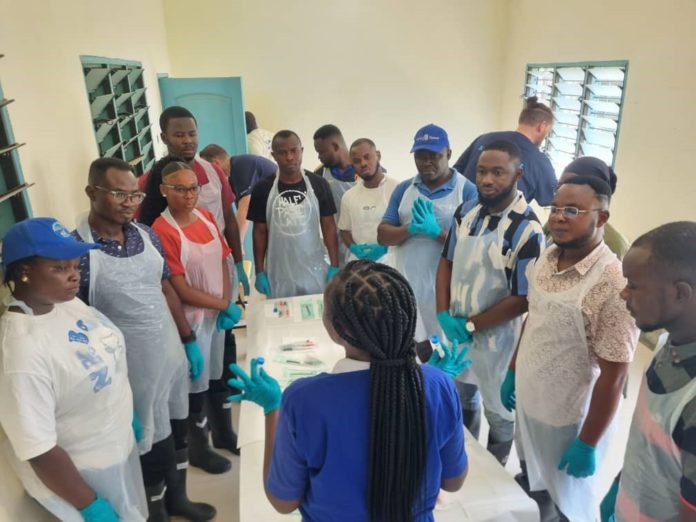
The United Kingdom’s Department for Environment, Food and Rural Affairs (Defra) has trained twenty-six fisheries officers from Ghana’s Fisheries Commission as part of its 2nd cohort of the program.
The officers have completed specialized training in fish health and biosecurity which brings the total number of trained officers to 56 under the Animal Health System Strengthening Project (AHSS) initiative.
The training, conducted in Kumasi with practical sessions at the Ghana Fisheries Commission’s Pilot Aquaculture Centre in Kona-Odumase, marks the first formal education these officers have received in fish health and biosecurity.
The program aims to bolster Ghana’s capacity for effective fish health disease surveillance and diagnosis, integrating aquatic health systems into the nation’s overall health security framework.
Delivered by four Ghanaian veterinarians from the Fisheries Commission and supported by visiting experts from the Fish Health Inspectorate of the Centre for Environment, Fisheries and Aquaculture Science (Cefas), the training included both classroom and practical components.
Participants engaged in fish mortality and disease investigation scenarios, reviewed best practice biosecurity measures, and discussed risk mitigation.
Topics covered included poor water quality, fish stocking, husbandry, disinfection methods, antimicrobial use and resistance (AMR), and standardized data recording.
The initiative is part of a broader UK-Ghana partnership under the AHSS project, which also operates in Nigeria, Zambia, and The Gambia, aligning with global goals such as the UN Sustainable Development Goals and the African Union’s Agenda 2063.
Read the statement below:
DEFRA-UK Trains 2nd Cohort of Ghanaian Fishery Officers on Fish Health and Biosecurity
A group of twenty-six (26) carefully selected fisheries officers of the Fisheries Commission of Ghana have benefited from specialized fish health and biosecurity training, with support from the UK Government. This brings to fifty-six (56) the number of officers trained with support from the Animal Health System Strengthening Project (AHSS), a UK overseas development assistance (ODA) project managed by the UK government’s Department for Environment, Food and Rural Affairs (Defra). The training took place in Kumasi with practical sessions run at the Ghana Fisheries Commission’s Pilot Aquaculture Centre at Kona-Odumase. Though crucial to detecting, controlling, and preventing known and emerging aquatic diseases, these officers have never previously received fish health and formal biosecurity training.
Through AHSS’ partnership with the Fisheries Commission, Ghana’s national capacity for effective fish health disease surveillance and diagnosis will be enhanced. The intervention is expected to help integrate aquatic health systems into Ghana’s overall health security framework and further cement the strong partnership between the UK and Ghana in the area of development and science.
The training was delivered by four trained Ghanaian veterinarians, who work with the Fisheries Commission, supported by visiting experts from the Fish Health Inspectorate of the Centre for Environment, Fisheries and Aquaculture Science (Cefas), one of Defra’s science agencies, responsible for delivering the AHSS project.
The trained officers will be guided to utilize the skills and knowledge gained to promote fish disease prevention and management strategies as part of the extension services for fish farmers across the country. They will also promote sustainable development of aquaculture.
The UK experts and Ghanaian veterinarians engaged the fisheries officers in both practical and classroom sessions to enhance both their knowledge and skills. Fish mortality and disease investigation scenarios were devised to test officers’ knowledge. Best practice biosecurity measures for aquaculture were discussed and identified risk mitigation measures were reviewed. Issues of poor water quality, fish stocking, fish husbandry, disinfections methods, antimicrobial use, and resistance (AMR), and standardised data recording documents and templates were introduced to the officers.
The Animal Health Systems Strengthening (AHSS) project in Ghana, is part of a flagship Official Development Assistance (ODA) funding bilateral technical partnership between the United Kingdom’s Department for Environment, Food & Rural Affairs (Defra) and countries in Africa, including Ghana, Nigeria, Zambia, and The Gambia.
The AHSS project complements efforts made by national government and other key stakeholders to achieve SD Goals 1, 2 and 3 (Zero Poverty, Zero Hunger, Good Health and Wellbeing) and other high level strategic objectives including the African Union (AU) Agenda 2063, and Zero by 2030: The global strategic plan to end human deaths from dog-mediated rabies by 2030.
READ ALSO:
- I have not slept with Fella Makafui for nearly one year – Medikal reveals
- Akufo-Addo’s convoy involved in tragic accident at Bunso Junction [Photos]
- Fella Makafui physically assaults me, destroys my properties – Medikal cries
